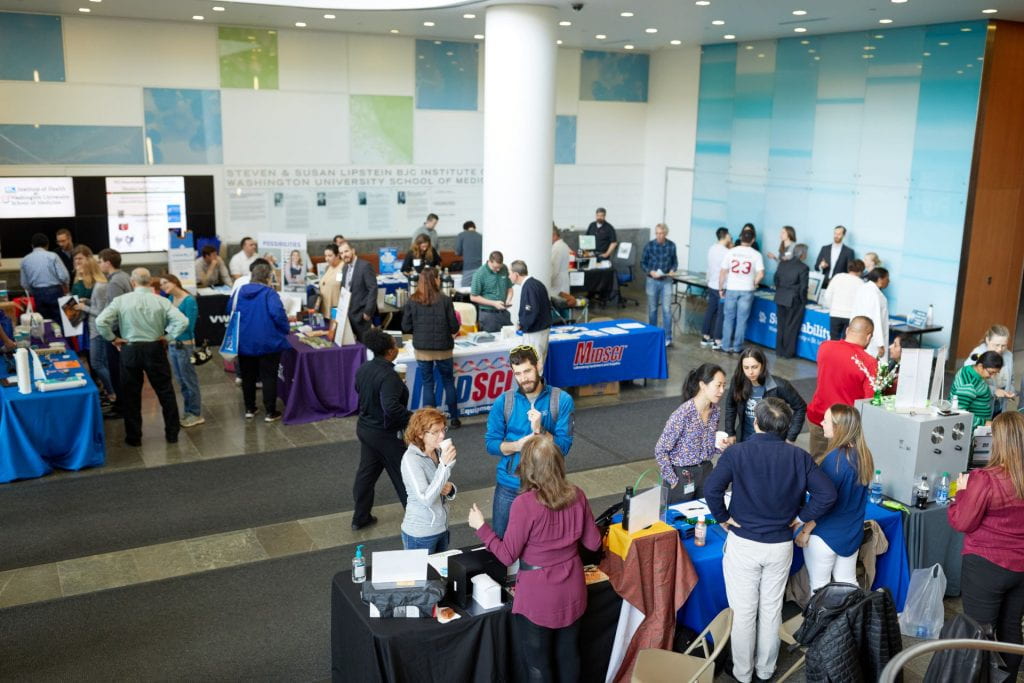Do you need signs and posters to guide lab members on sustainable practices? Fill out the signage request form now!
- For a comprehensive list of strategies to green your lab, please download the Green Labs Guide.
- Print a recycling poster for your lab.
- Print a Styrofoam cooler return poster for your lab.
- To receive tips on greening your lab, make sure to subscribe to the program’s quarterly newsletter!
While the electrical grid is steadily becoming cleaner, Missouri still relies heavily on coal for power. Reducing energy demand in labs is the most impactful step towards minimizing our collective carbon footprint.
Here are several tips to help achieve our energy-use reduction goals:
- Shut the sash on fume hoods when not in use.
- Always turn off equipment when not in use and unplug easily accessible equipment.
- Maximize used space in freezers and autoclaves to reduce equipment use.
- Keep incubator, autoclave, refrigerator, and freezer doors shut at all times.
- Decrease the energy use of -80 freezers by up to 40% by “warming up” to -70°C if your specific samples can be safely stored at a warmer temperature.
Autoclaves:
- Only autoclave items that require it.
- Keep autoclave door closed at all times to avoid heat loss.
- Combine loads with other lab members. Run full loads.
- Do not operate an autoclave without training. Select settings with care to avoid running a second cycle.
- Establish an automatic schedule to power down overnight and on weekends. (Contact a maintenance professional.)
Ultra-Low Temperature Freezers:
- Some samples can be safely stored at -70°C rather than -80°C. This can reduce energy use by up to 40%. Find out if your samples qualify at freezerchallenge.org
- Maximize space use in freezers and consider sharing with another lab to reduce the need for additional units.
- Maintain a detailed inventory to minimize the time the freezer door is open while you search for samples.
- Follow regular preventative maintenance to ensure freezers are running as efficiently as possible.
- Replace old freezers (10+ years) with new high efficiency units.
- Visit the ULT Freezer page for more information.
Research laboratories are one of the largest consumers of water on campus. Many experimental procedures and machines require water for a lab to function.
- Use the lowest appropriate water purity and sterility for the task at hand. For example, use tap water for washing hands and dishes. Only use deionized water and filtered water when the task requires it.
- Install low-flow aerators on lab faucets.
- Follow the guidelines for efficient autoclave use (see Equipment section above).
- Use melted ice to fill water baths or invest in a bead bath as an alternative for traditional water baths.
- Recycle and reuse paper. Paper manufacturing uses a significant amount of water. You can reduce this by recycling paper and purchasing paper made with recycled content.
- Do not leave faucets running and report leaks to the facilities department immediately.
For a comprehensive list of disposal procedures for common lab waste, please refer to the Waste Disposal Guide.
While many procedures require single use supplies to avoid contamination, some supplies can be safely reused. Labs should focus on minimizing single-use items to reduce waste.
- Consider purchasing durable glass labware instead of plastic, when possible. Use glass bottles to store filtered water, solutions, etc. instead of disposable plastic tubes.
- Avoid purchasing and storing more chemicals than necessary. Only purchase large or bulk supplies for products your lab will realistically use.
- Opt for a reloadable pipette tip system instead of tips that come in disposable plastic boxes.
- Make sure to sort waste correctly, do not contaminant recycling with non-recyclables. For more specifics, please consult the Green Labs Guide. Request a recycling poster for your lab here.
- Some vendors have Styrofoam cooler return programs. Local businesses (shipping/packing companies, stray animal rescues, etc.) will accept styrofoam cooler donations.
- Find detailed information on how to dispose of hazardous & nonstandard materials here.
- Find out how to donate and receive items from other areas on campus through the University Surplus, Reuse, and Donation programs.
Many experiments require potentially harmful chemicals and other hazardous materials. While not always available, some chemicals do have “greener” alternatives. Please consult the following resources for more information:
- Millepore Sigma DOZN Quantitative Green Chemistry Evaluator
- American Chemistry Society: Green Chemistry
- Cleaner Solutions Database
- EPA Safer Chemical Ingredients List
- Inkemia green chemicals
Additionally, steps can be taken to reduce the presence of highly toxic mercury in labs:
- Switch mercury microscope bulbs with LED bulbs, solid state devices, or light engines.
- Replace mercury thermometers.
- Contact EH&S immediately in the instance of a spill.
Please contact Environmental Health & Safety for further questions or information on proper disposal.

A few changes in purchasing habits can greatly reduce the waste and emissions produced by manufacturing, packing, and shipping products for your lab.
- If available, purchase items from your department’s on-campus stock room instead of having something similar shipped to your lab.
- Opt for Energy STAR certified products when selecting large appliances (ULT freezers, refrigerators, etc.).
- Consolidate orders and buy in bulk to reduce packaging and shipping.
- Check out the Office Supply Exchange before buying office supplies.
- Several vendors, including Office Essentials, will flag sustainable products as “Green” on their websites.
- ThermoFisher offers a recyclable paper cooler for some temperature-sensitive products to reduce use of polystyrene coolers.
- MilliporeSigma offers a “Greener Alternatives” database of products and chemicals.
- Purchase from local vendors, such as MidSci, Office Essentials, and VWR, to reduce shipping emissions.